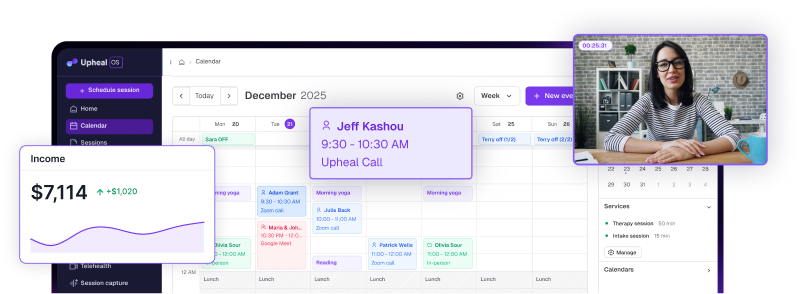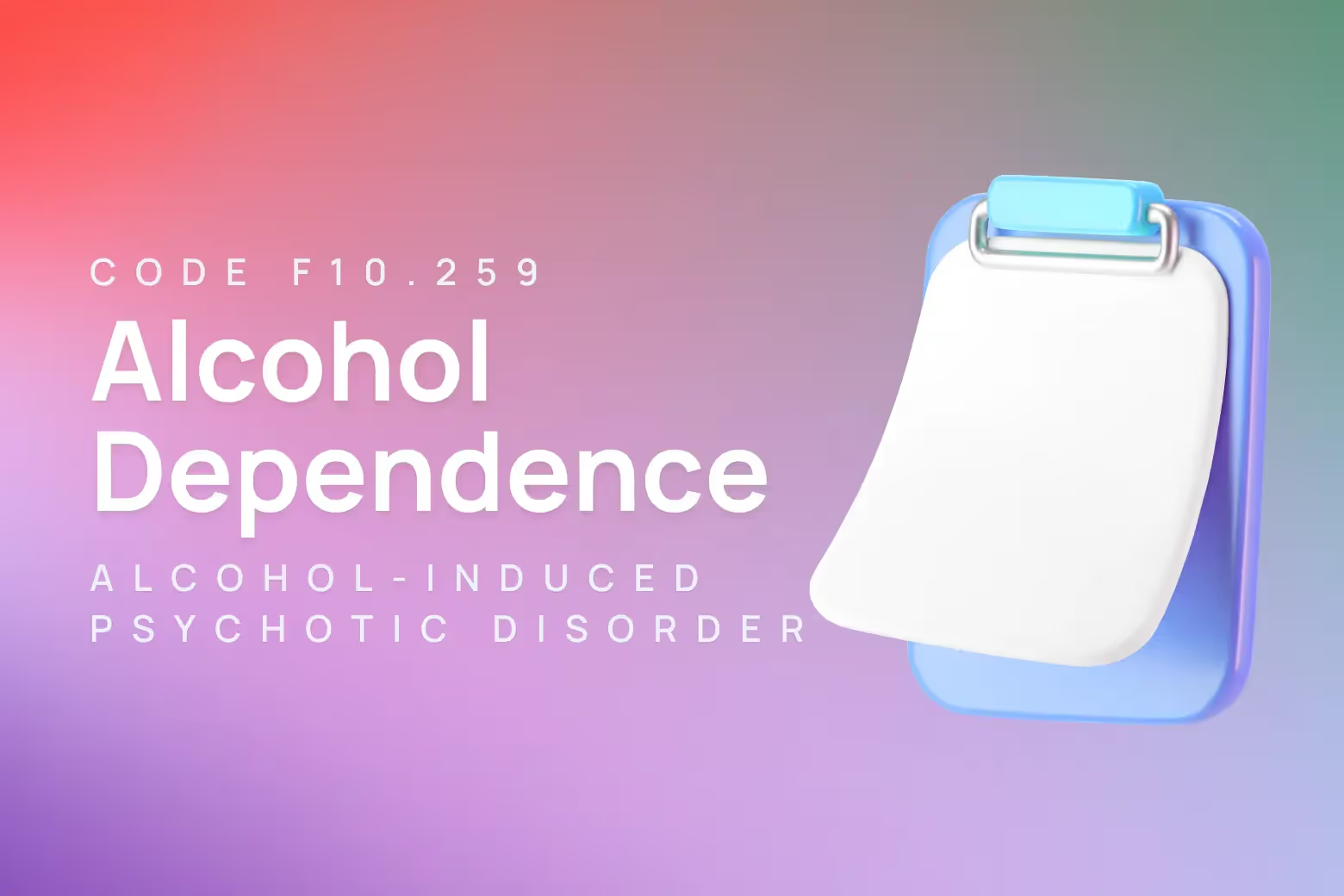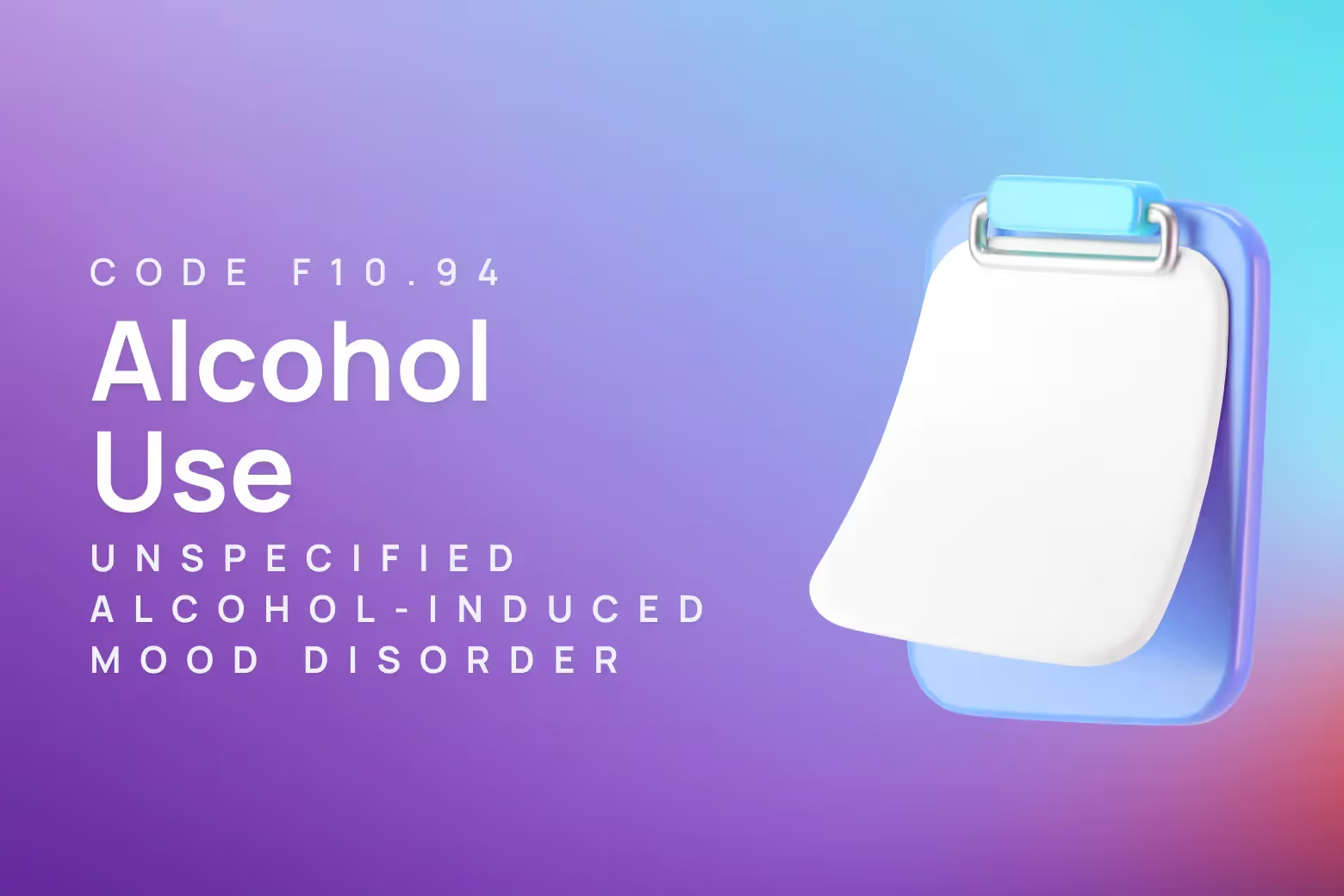ICD-10 code for alcohol dependence with intoxication, uncomplicated

F10.220 is the ICD-10 code for alcohol dependence with intoxication, uncomplicated.
This code represents a situation where someone with moderate to severe alcohol use disorder presents while currently intoxicated, without additional complications like delirium.
Proper coding ensures accurate documentation for treatment planning and reimbursement.
Key features:
- F10.220 indicates the presence of both alcohol dependence (moderate to severe) and current intoxication without complicating factors
- The fourth character "2" denotes moderate to severe alcohol use disorder, distinguishing it from mild presentations
- This code should only be used when intoxication and dependence co-occur; the presence of intoxication takes precedence over standalone dependence coding
- Accurate diagnosis requires comprehensive assessment of both current intoxication symptoms and established patterns of problematic alcohol use

Diagnostic criteria for alcohol dependence with intoxication (F10.220)
Understanding F10.220 requires familiarity with two separate but interrelated clinical presentations: alcohol dependence and acute intoxication.
Alcohol dependence reflects a persistent pattern of problematic drinking that causes significant impairment. When someone meets criteria for moderate to severe alcohol use disorder, they demonstrate at least four of eleven possible symptoms over a twelve-month period.
These symptoms fall into several categories:
- Loss of control: Drinking more than intended, unsuccessful attempts to cut down, significant time spent obtaining or recovering from alcohol
- Functional impairment: Failure to fulfill work, school, or home obligations, giving up important activities, continued use despite interpersonal problems
- Physical dependence: Tolerance requiring increased amounts for desired effects, withdrawal symptoms when stopping
- Risk continuation: Drinking in physically hazardous situations, continued use despite physical or psychological problems caused by alcohol
- Craving: Strong desire or urge to use alcohol
The intoxication component refers to recent alcohol ingestion resulting in clinically significant behavioral or psychological changes. Signs may include slurred speech, unsteady gait, poor coordination, impaired attention or memory, and stupor.
For F10.220 specifically, the patient presents with current intoxication symptoms while also meeting criteria for moderate to severe alcohol dependence. The "uncomplicated" designation means no delirium or other specified complications are present.
When to use F10.220 diagnosis code
Choosing the right ICD-10 code requires careful consideration of symptom severity and current presentation.
F10.220 vs F10.129 (mild alcohol use disorder with intoxication, unspecified)
The key distinction lies in symptom count. F10.129 applies when someone demonstrates two to three symptoms of alcohol use disorder while currently intoxicated. F10.220 is appropriate for those with four or more symptoms, indicating moderate to severe dependence.
Clinicians should count all eleven possible criteria over the past year to determine severity. Someone who drinks larger amounts than intended, has failed to cut down, and experiences withdrawal symptoms would meet three criteria — qualifying for F10.129. Adding persistent drinking despite interpersonal problems would bring the total to four, warranting F10.220 instead.
F10.220 vs F10.221 (alcohol dependence with intoxication, delirium)
Both codes reflect moderate to severe alcohol dependence with current intoxication. The difference is the presence of delirium — a serious complication involving confusion, disorientation, and altered consciousness.
F10.221 should be selected when the patient shows signs of alcohol-induced delirium alongside intoxication. This might include fluctuating awareness, difficulty focusing attention, disorganized thinking, or perceptual disturbances. F10.220 is used when intoxication occurs without these cognitive disturbances.
F10.220 vs F10.22 (alcohol dependence with intoxication)
F10.22 serves as the parent code for all alcohol dependence with intoxication presentations. F10.220 is the more specific code when documentation clearly indicates uncomplicated intoxication. Use F10.22 only when the level of specificity cannot be determined from available information.
Best practice involves documenting whether complications like delirium are present, allowing selection of the most precise code — either F10.220 for uncomplicated cases or F10.221 for those with delirium.
Related ICD-10 codes
Understanding related codes helps ensure accurate diagnosis and appropriate treatment planning:
- F10.22 - Alcohol dependence with intoxication (parent code)
- F10.221 - Alcohol dependence with intoxication, delirium
- F10.229 - Alcohol dependence with intoxication, unspecified
- F10.10 - Mild alcohol use disorder
- F10.20 - Moderate to severe alcohol use disorder
- F10.120 - Mild alcohol use disorder with intoxication, uncomplicated
- F10.129 - Mild alcohol use disorder with intoxication, unspecified
- F10.230 - Alcohol dependence with withdrawal, uncomplicated
- F10.231 - Alcohol dependence with withdrawal, delirium
Interventions and CPT codes for alcohol dependence with intoxication
Treatment for F10.220 typically involves both immediate management of intoxication and longer-term intervention for underlying dependence.
Initial assessment and diagnostic evaluation
Beginning treatment requires thorough evaluation to establish diagnosis, assess severity, and develop an appropriate plan. Clinicians should conduct a comprehensive psychiatric diagnostic evaluation including substance use history, mental status examination, and identification of any co-occurring conditions.
CPT 90791 - Psychiatric diagnostic evaluation. This code applies for initial intake sessions where clinicians gather history, perform mental status examination, establish diagnosis, and formulate a treatment plan
Individual psychotherapy
Ongoing individual therapy forms the backbone of treatment for alcohol dependence. Evidence supports several approaches including cognitive behavioral therapy and motivational interviewing.
Cognitive behavioral therapy helps clients identify triggers for drinking and develop more effective coping strategies. Sessions typically involve cognitive restructuring, skills training for high-risk situations, problem-solving instruction, and relapse prevention planning.
Motivational interviewing addresses ambivalence about change by helping clients explore their own reasons for reducing drinking. This approach works particularly well in early treatment stages and for those with less severe dependence.
Time-based psychotherapy codes:
CPT 90832 - Psychotherapy, 30 minutes (16-37 minutes)
CPT 90834 - Psychotherapy, 45 minutes (38-52 minutes)
CPT 90837 - Psychotherapy, 60 minutes (53+ minutes)
Select the code matching actual session duration. These codes cover motivational interviewing, cognitive behavioral approaches, relapse prevention counseling, and other evidence-based individual interventions. (CPT codes alcohol abuse.txt)
Family therapy
Including family members often improves treatment outcomes. Family sessions address relationship dynamics, codependency patterns, and family support for recovery.
CPT 90846 - Family psychotherapy without patient present
CPT 90847 - Family psychotherapy with patient present
These codes apply when working with family members to understand how family interactions influence drinking and to develop family-based relapse prevention strategies.
Group therapy
Group treatment provides peer support and allows clients to learn from others facing similar challenges. Group sessions may focus on skills development, relapse prevention, or mutual support.
CPT 90853 - Group psychotherapy
This code covers substance use disorder groups addressing alcohol dependence, including skills-based groups and relapse prevention groups.
Screening and brief intervention
For some patients, particularly in primary care or urgent care settings, brief screening and intervention may be appropriate.
CPT 99408 - Screening and brief intervention, 15-30 minutes (commercial insurance)
CPT 99409 - Screening and brief intervention, >30 minutes (commercial insurance)
HCPCS G0396 - Structured assessment and brief intervention, 15-30 minutes (Medicare)
HCPCS G0397 - Structured assessment and brief intervention, >30 minutes (Medicare)
These codes require documentation of the screening tool used (such as AUDIT or AUDIT-C), score obtained, risk level identified, time spent, and brief intervention elements delivered.
Crisis intervention
When clients present in acute distress related to intoxication or imminent danger, crisis intervention may be necessary.
CPT 90839 - Psychotherapy for crisis, first 60 minutesCPT 90840 - Add-on code for each additional 30 minutes
These codes apply when managing acute crises involving intoxication risk, withdrawal concerns, or situations where the client faces imminent harm.
How Upheal improves F10.220 ICD-10 documentation
Clinical documentation for alcohol dependence with intoxication requires careful attention to diagnostic criteria, current symptoms, and treatment planning. Upheal's clinical documentation platform helps behavioral health providers maintain thorough, accurate records while reducing time spent on paperwork.
Suggesting appropriate ICD-10 codes based on session content
Upheal analyzes session conversations to identify relevant diagnostic information. When a client discusses their drinking patterns, failed attempts to cut down, tolerance development, or continued use despite consequences, the platform recognizes these as potential indicators of alcohol dependence.
The system can identify when clients describe current intoxication symptoms alongside established patterns of problematic drinking. This helps clinicians consider F10.220 when appropriate, ensuring diagnostic accuracy.
By reviewing session transcripts for specific symptom mentions, Upheal helps clinicians track whether clients meet criteria for moderate to severe alcohol use disorder. The platform can highlight when multiple diagnostic criteria are discussed across sessions, supporting more accurate severity assessment.
Maintaining HIPAA-compliant records with proper diagnostic coding
Accurate coding matters for treatment planning, insurance reimbursement, and continuity of care. Upheal helps ensure diagnostic codes match the clinical picture documented in session notes.
The platform maintains secure, encrypted record that meet HIPAA requirements while making it easier to document the specific criteria supporting an F10.220 diagnosis. Clinicians can reference previous sessions to track symptom patterns over time, demonstrating the persistence required for dependence diagnosis.
When clients move between different levels of care or transfer to new providers, proper diagnostic coding in Upheal's system ensures important clinical information travels with them. Clear documentation of alcohol dependence with intoxication helps receiving clinicians understand the client's needs immediately.
Reducing administrative burden so you can focus on client care
Documentation requirements for substance use treatment can be extensive. Recording detailed assessments, tracking multiple diagnostic criteria, noting session content, and preparing treatment plans demands significant time.
Upheal automates much of this documentation work. After sessions, the platform generates comprehensive notes capturing key clinical information discussed. Clinicians can review and edit these notes rather than writing them from scratch, saving valuable time.
This time savings allows clinicians to see more clients or spend additional time on clinical preparation rather than paperwork. For providers treating complex cases like F10.220, having more time for case conceptualization and treatment planning improves overall care quality.
The platform also helps with treatment planning by tracking progress on identified goals. When working with clients on reducing drinking, developing coping skills, or managing cravings, Upheal can highlight changes discussed across sessions, making it easier to document clinical progress.
Supporting clients with alcohol dependence and intoxication
Working with clients who have F10.220 requires a comprehensive approach addressing both immediate safety and longer-term recovery.
Clinicians should first ensure client safety when intoxication is present. This may involve assessing for medical complications, evaluating suicide or violence risk, and determining whether emergency medical intervention is needed. Once immediate safety is established, clinicians can engage clients in discussing their drinking patterns and exploring motivation for change.
Building a strong therapeutic alliance proves essential. Many clients feel shame about their drinking or ambivalence about change. A non-judgmental, empathic stance helps clients feel comfortable discussing their struggles honestly. Research shows that clinician empathy, warmth, and strong interpersonal skills improve treatment retention and outcomes.
Treatment planning should consider both psychosocial interventions and pharmacotherapy. Cognitive behavioral therapy and motivational interviewing have strong evidence for effectiveness in alcohol dependence. Medications like naltrexone and acamprosate can support relapse prevention when combined with therapy. Clinicians should discuss these options with clients and involve them in treatment decisions.
Accurate documentation throughout treatment helps track progress and supports continuity of care. Using clinical documentation platforms like Upheal allows clinicians to maintain thorough records efficiently, ensuring important clinical information is captured while spending less time on paperwork. This means more time for the clinical work that actually helps clients recover.
Try Upheal for free to see how AI-assisted documentation can improve your practice while supporting better outcomes for clients facing alcohol dependence.












